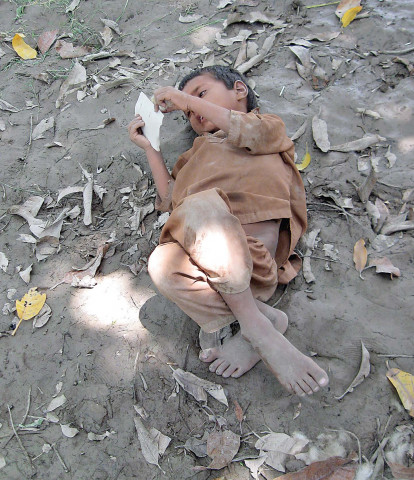Empty-handed displaced people extend hospitality
Almost 400 people have taken shelter on the extreme outskirts of Rohailanwali with no access to a steady food supply.

The water spreads out as far as one can see. Almost 400 people have taken shelter on the extreme outskirts of Rohailanwali from Mochiwala, with no access to a steady supply of food, water or medical aid. They have brought about 100 animals with them, who are silent witnesses to the destruction the floods have caused in southern Punjab.
“Children are getting fever and cholera,” Shamim says, as she rocks her seven-month-old child to sleep. The child was up all night with a fever.
They escaped the torrents by boat, with nothing but the clothes on their backs.
“We have just one set of clothes, the ones that we’re wearing. We hear that people have used boats to get into our houses and steal our possessions,” Shamim says. “What will we go back to?”
There is no relief camp nearby, and no food for the children, who swim in the swollen canal nearby and sit languidly in the shade of the trees.
“Everything is gone from our area. Even the landlords have lost everything, how will they help us? But they have left already; maybe they have gone to Multan.”
While the landlords could afford the fare, these people cannot even afford to travel to relief camps. Rana Kamran, who had leased 50 acres of land, says he has lost millions of rupees because the crop has been destroyed.
As food is not being supplied, people are looking to get it themselves. Ghulam Hussain, who worked on a farm, has built a fishing net to catch fish. “But it is still a matter of luck if we manage to catch anything.”
That they still believe in luck is a testament to their spirit.
“Food is so expensive now. It is Rs140 for a kilo of sugar and Rs150 for ghee,” Hussain says.
His family has brought goats, cows, chickens and a dog with them. “A truck ran over our cow’s legs last night,” Hussain says with a bereft look. “That’s why it can’t move.”
Hospitality, however, still thrives among the flood victims. They insist on offering visitors a cup of tea and let stray dogs sleep under their charpais. “They just want shade,” says Hussain’s wife, as the chickens cluck around her feet.
A group of villagers from Durg Hatti, who have taken shelter at a relative’s house, say no one has come to see them. “No government official ever visited us … why would they come now?” Kalsoom says. “We lived in a settlement of 300 people who were all labourers. We grew cotton and vegetables … our houses went into the Chenab.”
A mother of two, her two-year-old daughter Zaitoon is vomiting and has fever. She has managed to get medicine for now but does not know where the next dose will come from.
“There are so many little children here,” Kalsoom says.
The water that the children swim in is stagnant, making them sicker.
One man says he had never seen a flood before. “On the British era roads you see drains … maybe there was a flood in their time. I had never thought this area would be flooded.”
Published in The Express Tribune, August 21st, 2010.



















COMMENTS
Comments are moderated and generally will be posted if they are on-topic and not abusive.
For more information, please see our Comments FAQ